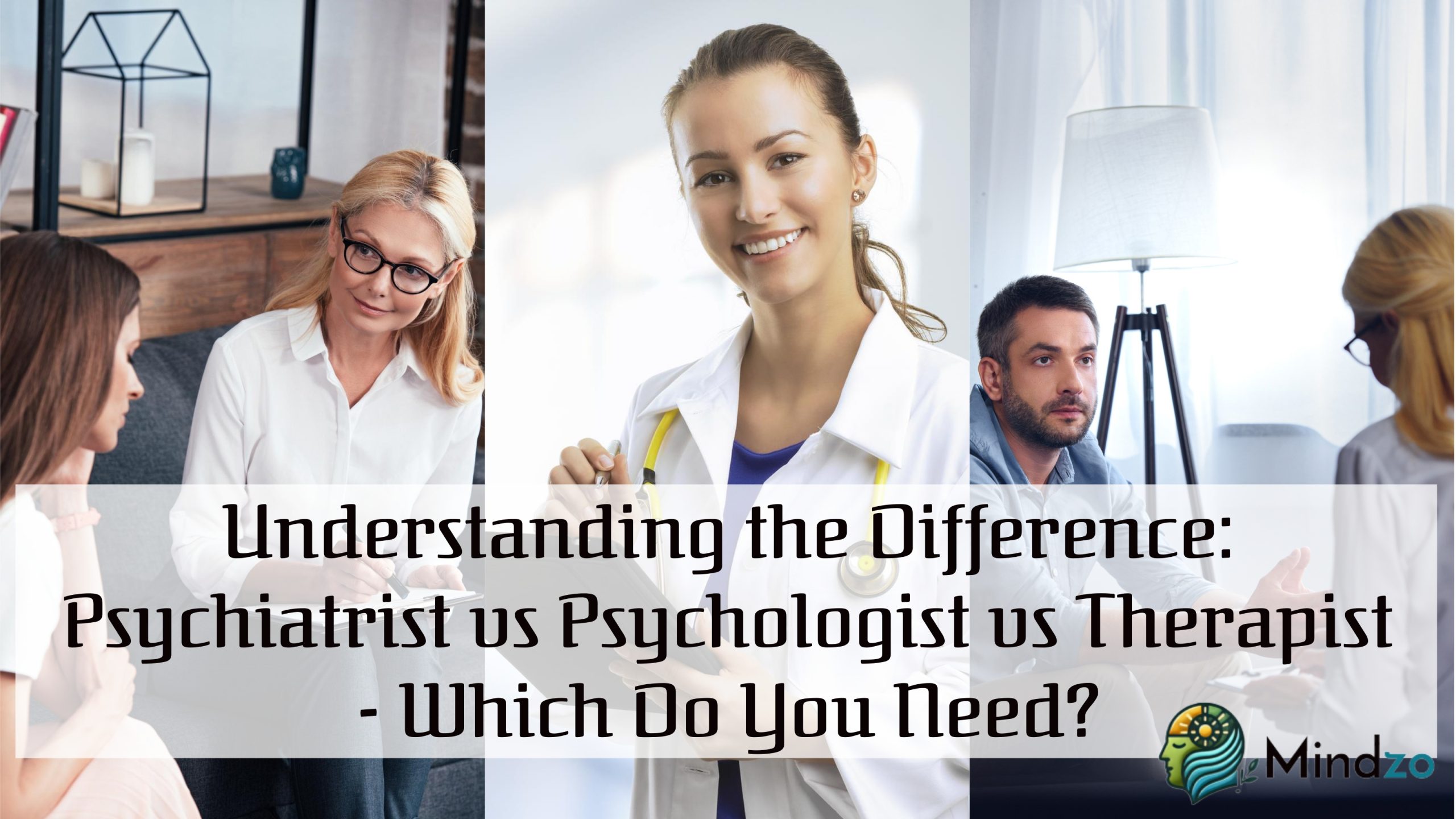Understanding the Difference: Psychiatrist vs Psychologist vs Therapist – Which Do You Need?

When seeking mental health help, it’s common to wonder who can best assist: a psychiatrist, a psychologist, or a therapist. All of these professionals support mental well-being, but they have different training and roles. In general, psychiatrists are medical doctors (MD or DO) who specialize in mental health, psychologists hold doctoral degrees in psychology, and therapists (often licensed counselors or social workers) typically have master’s degrees. Each plays a unique role: as one expert notes, “from psychiatrists who can prescribe medication to therapists who provide counseling and psychologists who offer specialized interventions, each plays a crucial role”. Understanding these differences can help you choose the right provider for your needs.
Who is a Psychiatrist?
A psychiatrist is a medical doctor (M.D. or D.O.) who has completed medical school and a specialized residency in psychiatry. Because they are physicians, psychiatrists can prescribe psychiatric medications (antidepressants, antipsychotics, mood stabilizers, etc.) and manage their effects. They are trained to diagnose and treat complex mental health conditions – especially severe or biologically based illnesses such as bipolar disorder, schizophrenia, or major depression. In addition to prescribing medication, psychiatrists may provide some psychotherapy, but their main focus is often on the medical aspects of treatment.
For example, a psychiatrist might evaluate whether depression is partly due to a medical issue or adjust medications while also recommending therapy. Some psychiatrists use advanced treatments for very severe cases (like electroconvulsive therapy or transcranial magnetic stimulation), though those are less common. Because of their medical training, psychiatrists can also order lab tests or imaging to rule out physical causes of symptoms. In practice, psychiatrists often see patients less frequently for medication management, collaborating with therapists and psychologists who provide more frequent therapy sessions.
Who is a Psychologist?
A psychologist typically has a doctoral degree (Ph.D. or Psy.D.) in psychology. Psychologists are experts in the human mind and behavior. They are trained to assess, diagnose, and treat mental health disorders using talk therapy and psychological testing, but usually cannot prescribe medication. Instead, psychologists focus on counseling and behavioral interventions.
Psychologists often conduct psychological evaluations (using interviews or standardized tests) to understand issues like personality, learning disabilities, or cognitive impairments. In therapy, psychologists use evidence-based approaches such as cognitive behavioral therapy (CBT), dialectical behavior therapy (DBT), exposure therapy, or psychodynamic therapy to help clients change unhelpful thoughts and behaviors. For instance, someone with anxiety might work with a psychologist on exposure exercises and CBT techniques to reduce fear. Psychology is also a research field, so many psychologists incorporate the latest scientific findings into treatment.
Because psychologists are not medical doctors, they often refer patients to psychiatrists if medication might be helpful. They usually see clients more frequently to provide ongoing therapy. In sum, if you want in-depth therapy or testing and prefer a non-medical approach, a psychologist or therapist may be the right choice.
Who is a Therapist?
“Therapist” is a broad, catch-all term for professionals who provide counseling or psychotherapy. This includes licensed counselors, social workers, marriage and family therapists (LMFTs. Therapists typically have a master’s degree in a mental health field and are licensed by the state. Unlike psychiatrists, therapists generally do not prescribe medication, their role is to listen, support, and guide clients through talk therapy.
Therapists help people cope with emotional and life challenges such as relationship issues, stress, grief, or mild depression and anxiety. They often specialize in particular areas: for example, Licensed Clinical Social Workers (LCSWs) might focus on family conflicts and social support, Licensed Professional Counselors (LPCs) might work with trauma or career issues, and Marriage and Family Therapists (LMFTs) focus on couples or family dynamics. Many therapists use cognitive-behavioral techniques, humanistic approaches, mindfulness, or solution-focused counseling to help clients develop coping skills and insight.
Many therapists now offer counseling via online sessions or in their offices. Therapy usually involves talking through challenges and learning coping skills.
Therapists typically meet with clients regularly. They can work in schools, clinics, hospitals, private practice, or community agencies. For example, a marriage therapist may help couples improve communication, while an addiction counselor helps clients develop strategies to stay sober. Overall, therapists provide a supportive, non-judgmental space to explore feelings and behaviors. They have specialized training in psychotherapy techniques, although the exact approach can vary by therapist.
Education and Training
- Psychiatrists complete a medical degree (4 years) plus a residency in psychiatry (3-4 years). Their training covers all bodily systems and psychiatric illness.
- Psychologists complete a doctoral degree in psychology (Ph.D. or Psy.D.), which usually takes 5-7 years after college, plus supervised clinical hours. They learn psychological theory, research, and therapy techniques.
- Therapists/Counselors usually earn a master’s degree in a mental health field (2-3 years) and must obtain a professional license (LPC, LCSW, etc.).
In short, psychiatrists have the most medical training, psychologists have extensive psychological training, and therapists have specialized clinical training. All must be licensed, but only psychiatrists prescribe medications.
Treatment Methods
- Medication Management: Because psychiatrists are medical doctors, they prescribe and adjust medications for mental health conditions (e.g. antidepressants for depression, antipsychotics for schizophrenia). They may also recommend medical procedures if needed. No other mental health professionals can prescribe medication (except in limited cases). Managing side effects and physical health (like sleep or nutrition) is part of their care.
- Talk Therapy (Psychotherapy): Psychologists and therapists both specialize in psychotherapy, which is “talk therapy” aimed at improving mental health. Common approaches include Cognitive Behavioral Therapy (CBT), Dialectical Behavior Therapy (DBT), Motivational Interviewing, Interpersonal Therapy, and Family/Marriage Therapy. For example, CBT might be used by a psychologist to help someone overcome anxiety, while a family therapist might use communication exercises to help family members resolve conflicts.
- Specialized Therapies: Some therapists have niches, such as art therapy, play therapy, or trauma-focused therapies. Psychologists and therapists often employ evidence-based practices tailored to specific conditions (e.g. exposure therapy for phobias, school-based counseling for children).
- Assessments and Testing: Psychologists frequently conduct psychological assessments (IQ tests, personality inventories, learning disability evaluations) to guide treatment. Therapists and psychiatrists generally do fewer formal tests but rely on clinical interviews and questionnaires to diagnose and plan care.
- Supportive Counseling: Therapists (and psychologists) provide support, teach coping strategies, and help clients navigate life stressors (grief, work stress, relationship issues). This often involves setting goals, homework, and skill-building.
In practice, many patients benefit from a team approach. For instance, someone with major depression may see a psychiatrist for medication and also meet weekly with a therapist for CBT. Research shows that combining medication and psychotherapy often produces the best results for conditions like depression and anxiety.
Which Provider is Right for You?
Choosing the right professional depends on your situation:
- Medication Needed: If you believe you may need medication (for example, you have moderate-to-severe depression, bipolar disorder, schizophrenia, or medication-resistant anxiety), start with a psychiatrist. They can evaluate your symptoms medically and discuss prescriptions or other biological treatments.
- Talk Therapy Focus: If you mainly want counseling or to explore personal issues (stress, coping, relationships, trauma), a psychologist or therapist is a good choice. They will use psychotherapy to help you change thought patterns and behaviors. A psychologist is best if you want specialized testing or someone with extensive training, while a licensed therapist or counselor is great for practical coping strategies and support.
- Combination: Many people see both a psychiatrist and a therapist. For example, a psychiatrist provides the right medication, and a therapist or psychologist meets weekly for counseling. This team approach can address both physical and emotional aspects of health.
- Accessibility and Comfort: Consider what’s available and what feels comfortable. A therapist might be more accessible and offer lower-cost sessions. Some therapists offer online or office sessions, psychiatrists may have fewer openings. You might start with a therapist who can then refer you to a psychiatrist if needed.
- Specialty Needs: If you have family or relationship issues, look for a marriage/family therapist or social worker. For substance use issues, seek a counselor specializing in addiction. Schools often have school psychologists or counselors for children’s issues.
- Trust Your Instincts: It’s important to feel comfortable with your provider. Don’t hesitate to ask questions about their training, approach, and experience. You have the right to switch providers if one approach isn’t working.
In summary
Every role is valuable in mental health care: psychiatrists handle the medical side, psychologists bring deep psychological expertise, and therapists provide hands-on counseling. Whichever you choose, the goal is to get help. Don’t be afraid to ask for referrals from your doctor. The key is to get started – with the right support, many people make significant progress toward better mental health.
-
 Beyond Words: The Emotional Medicine of a Simple HugOctober 27, 2025
Beyond Words: The Emotional Medicine of a Simple HugOctober 27, 2025 -
 Music’s Unique Therapeutic BenefitsOctober 23, 2025
Music’s Unique Therapeutic BenefitsOctober 23, 2025

Leave a Reply